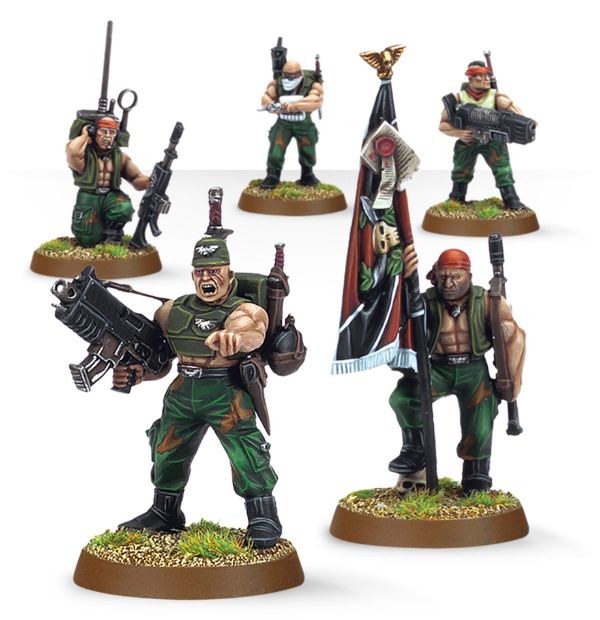
Hi guys. Today I’m going to discuss something a little different. I want to talk about the economics of limited run models.
In my article last week, I mentioned the new Catachan Colonel that’ll be coming to local game stores near you once we open up. The model itself is fantastic, but what I find particularly interesting about it is its scarcity.
I don’t know exactly how scarce this item will be. Nor do we know whether Games Workshop will produce a second run of it in the future. But we do know that, for the time being at least, we won’t be able to purchase the Colonel from GW. Instead, we’ll need to head to our local independent gaming store.
And this prompts a question: how will these stores sell this item?
The model is brilliant, and many people are going to want it. But the model is also scarce — artificially so, sure, but scarce nonetheless.
In his classic work on free market economics, Basic Economics, Thomas Sowell writes that scarcity “means that what everybody wants adds up to more than there is.” This simple formulation elegantly explains the situation in which our Colonel finds himself. He’s scarce and everybody wants him.
And a scarce product that is in high demand leads to increased prices.
Before discussing how game stores should deal with this economic fact, let’s first take a brief detour in order to establish the subjectivity of value.
Logic dictates that in order for a transaction to take place, both parties must value the other’s item more highly than they do their own. For example, upon hearing about the new Colonel, an avid Astra Militarum player phones up his friend who owns a gaming store and offers him 200 dollars for the Colonel when it is released. The friend gladly accepts this offer. Our avid Militarum player values the Colonel more than the 200 dollars; our friend who owns the store values the 200 dollars more than the Colonel.
In Basic Economics, Sowell writes that “if there were any such thing as a “real” or objective value […] neither the buyer nor the seller would benefit from making a transaction at a price equal to that objective value, since what would be acquired would be of no greater value than what was given up. In that case, why bother to make the transaction in the first place?”
Value, then, is entirely subjective. Individuals value the products and services that are available to them in a variety of ways, and each individual places different values on different things at different times.
For more detail on this topic, I’d suggest a great article by Max Borders over at EconLib, The Relentless Subjectivity of Value.
How, then, should independent stores deal with the Colonel?
There is a myriad of ways that a gaming store could deal with a scarce item. The store manager could decide to simply display the product with a chosen price as he would any product in his store. Consumers in his store could then decide to purchase the item as they see fit.
All things considered, this wouldn’t be a good method of selling the Colonel. For example, let’s say that the manager sets a price of 30 dollars, which would be roughly equivalent to similar products elsewhere in his store. Very soon after opening, a customer will have purchased the Colonel. Indeed, this individual might have entered the store looking for a completely different product, but upon learning that the store is selling the Colonel for 30 dollars he snaps it up quick.

Instead, our store manager could individually contact regulars whom he knows will be interested in the product, informing them that he has the Colonel in stock and will gladly listen to offers. This would be something akin to wargaming nepotism, with those who are — so to speak — politically connected given first refusal on the Colonel.
While it does sounds a little on the shady side — especially after I used the word “nepotism” in the previous paragraph — this would actually be a pretty good way of dealing with the issue. The manager is leveraging his knowledge of the local economy to deliver a product to those who most value it. How does he assess who values the Colonel the most? He uses an imperfect but highly practical medium: money.
Another method would be to simply display the Colonel in the store as he would any other product, but at a price that he would willingly accept. Indeed, this price would be significantly higher than the 30 dollars of our first example. Perhaps our manager would set the price at 50 dollars. Perhaps he would set it at 100. That would be his decision.
This method handily avoids the problem of the first example. Now, most customers will think twice about purchasing the Colonel. Indeed, these individuals will value the money in their bank accounts more highly than they would the model.
But there will undoubtedly be someone for whom the higher-than-usual price is a great deal. Perhaps our avid Astra Militarum player from earlier didn’t phone his store manager friend to make him an offer on the Colonel, but instead he heads down to the store to pick up something else, and upon seeing the Colonel decides that he must have him in his collection, and gladly parts with his cash.
What is consistent across these examples? In each case, both parties in the transaction have come out ahead. Economics isn’t a zero-sum game. In a trade, it is not the case that one party is the winner and one party is the loser. For a transaction to take place, both parties must value the other’s item more than they do their own. In each example, the store manager comes out ahead, to one extent or another. And in each example, the individual purchasing the Colonel comes out ahead, to one extent or another.
To sum up, I want to quote an excellent article by Paul Mueller that was recently published at EconLib, What Is a Just Price?
From the final paragraph of the article, Mueller elegantly sums up the distinction between economic value and standards of behavior: “There is no objective economic value, no inherent quality of a good that we could use as a standard to assess whether the price it commands on the market is just or unjust. There are of course objective standards by which we could judge the behavior and motives of the parties involved—but those standards fall outside the economic toolbox and into the realm of ethics and philosophy, of norms and customs.”
Individuals are bound by norms and customs, but economic value is not. And the following is a fine example of individuals following the norms and customs of charitable behavior in difficult times.
The smashing chaps over at Bad Moon Cafe here in the UK recently held an online auction for the Colonel, raising over £300 for NHS Charities Together, a UK medical charity.
This sum was further supplemented by £200 from the good people at Siege Studios and £250 from the fine folks at the Wargaming Guild.
These people could’ve sold the Colonel at a handsome profit, using the proceeds to further their businesses, which would of course be a perfectly fine use of resources.
But instead they chose to use their newly acquired scarce resource to offer a little bit of help to those in need during a very troubling time. And for this, we should applaud them.
Many local gaming stores won’t recover from the current crisis. But many will. Those that have the grit and fortitude to climb their way out of the hole that we’re all currently in should be celebrated, and a little extra cash from the sale of a scarce model could go a long way to keep that business afloat.
And remember, Frontline Gaming sells gaming products at a discount, every day in their webcart!



